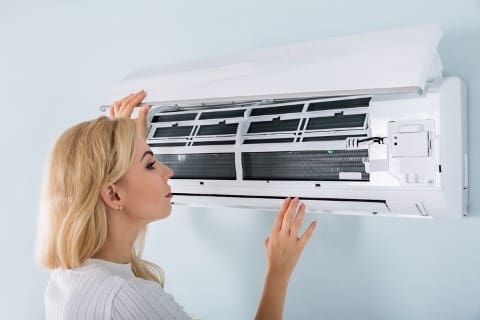
Your air conditioner’s efficiency matters for several reasons. For example, efficiency affects the AC’s energy consumption. The efficiency also determines how well the AC keeps your home comfortable. Below are several ways to gauge how efficient your AC is.
Find Out What Type of System You Have
Some AC unit types are more efficient than others. For example:
- Split systems with outdoor and indoor units are more efficient than window ACs
- Some AC brands are more efficient than others
- ACs paired with smart thermostats and controls are more efficient than those without smart pairings
- Ductless ACs tend to be more energy efficient than duct systems
Identifying your AC type will give you more insight into its efficiency.
Check Out Its Efficiency Ratings
AC efficiency ratings compare the cooling output with energy consumption. The less energy an AC consumes compared to its cooling output, the more efficient the system is. Below are different forms of AC ratings.
SEER
The seasonal energy efficiency rating (SEER) is the AC’s cooling output divided by the energy consumption over the same period, usually a year. A high SEER means high efficiency, and the reverse is true.
EER
The energy efficiency ratio (EER) is the ratio of an AC’s peak cooling output to its peak energy consumption. You can view the EER as an instantaneous efficiency rating and the SEER as the average efficiency rating over time.
Check if your system has an Energy Star certification. The U.S. Environmental Protection Agency (EPA) certifies energy-efficient products, such as ACs with high EERs and SEERs.
Assess the System’s Condition and Maintenance
Carefully assessing your AC’s current condition should also give you further insight into its efficiency. Even an Energy Star-certified AC might lose its efficiency under certain conditions. Maintenance helps to maintain efficiency, so inadequate maintenance is another indicator of compromised efficiency.
For example, you should suspect decreased efficiency if:
- The AC looks dirty
- You have not replaced the air filter in several months
- A professional hasn’t serviced the system for over a season
- The AC shows signs of visible damage, such as bent condenser fins or fan blades
Fortunately, AC maintenance or repair can solve such issues.
Measure Temperatures in Different Areas
Another way to gauge your AC’s efficiency is to measure its fresh air temperature. The test works best on a hot day when you need the AC to make your home comfortable. Run the AC for a few minutes before you begin the test.
Use a thermometer to measure the temperature of the air getting into the return vent and out of the supply vent. Next, take the temperatures at different rooms and parts of the house to gauge how well the fresh air reaches different house parts.
You should notice a significant temperature difference between the supply and return air if the AC is efficient. A narrow temperature difference or uneven temperature readings in different rooms mean the AC is inefficient and struggling to cool your home.
Evaluate the Building’s IAQ
Lastly, evaluate your indoor air quality (IAQ), which links to AC efficiency. Other than temperature, other IAQ measures include the level of humidity and air contaminants in the house. Thus, poor IAQ might be an indicator of low AC efficiency.
An efficient AC maintains adequate air circulation to prevent dust from settling in different parts of the house. An efficient AC also has an air filter that traps air contaminants. Lastly, an efficient system also helps with humidity control.
Contact Steele Brothers Heating Inc. for help with all your AC problems. We can evaluate and improve your AC’s efficiency. If you have a professionally designed and installed AC, you only need to maintain it properly and regularly to enjoy efficient services.
